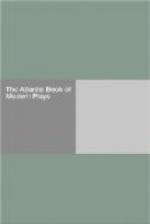HILDA. You are my son, too! For I would willingly have died if it could have kept us out of this war.
WALLACE. Yes. I am your son, too. And that’s why you wouldn’t respect me if I didn’t go through.
HILDA. No. I wouldn’t have respected you. But—but—(She breaks a bit, then controls herself.) You are quite sure you’re doing what’s right?
WALLACE (tenderly). Would I have been willing to hurt you like this?
HILDA (holding him close to her). My boy; my boy!
WALLACE. It’ll be all right, mother.
HILDA. Ah, yes. It will be all right. Nothing matters in time: it’s only the moments that hurt.
WALLACE (after a pause). Then you won’t tell my real age, or interfere?
HILDA. I respect your right to decide your own life.
WALLACE (joyed). Mother!
HILDA. I respect your dedication; your willingness to sacrifice for your beliefs. Why, Wallace, it would be a crime for me to stand in your way—even with my mother’s love. (He kisses her.) Do it all as cleanly as you can. I’ll hope and pray that you’ll come back to me. (Half breaking down and taking him in her arms). Oh, my boy; my boy. Let me hold you. You’ll never know how hard it is for a mother.
WALLACE (gently). But other mothers send their boys.
HILDA. Most of them believe in what their sons are fighting for. Mothers have got to believe in it; or else how could they stand the thought of bayonets stuck into the bodies they brought forth in their own blood? (There is a pause till she controls herself.) I’ll help you get your things together.
WALLACE. And father?
HILDA. He will be angry.
WALLACE. But you will make him understand?
HILDA. I’ll try. Yet you must be patient with him if he doesn’t understand. Don’t ever forget his long fight against all kinds of Prussianism when you hear him reviled by those who have always hated his radicalism and who, now, under the guise of patriotism, are trying to render him useless for further attacks on them after the war. He’s been persecuted so by them—even back in the days when our press was praising Germany and our distinguished citizens were dining at the Emperor’s table. Don’t forget all this, my boy. These days are hard for him—and me—harder perhaps than for you who go out to die in glory and praise. There are no flags for us, no music that stirs, no applause; but we too suffer in silence for what we believe. And it is only the strongest who can survive.—Now call your father.
WALLACE (goes to door). Dad! (He leaves door open and turns to his mother.) I’ll be getting my things together. (There is a pause. WHITE enters.) Dad, mother has something to ask you. (He looks from father to mother.) Thanks, little mother.
(He kisses her and goes out, taking the valise. His father and mother stand facing each other.)




